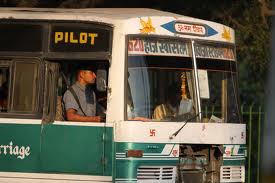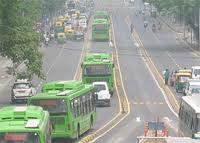BUS DRIVERS
India has variety of cultural and environmental distinction among regions, states and cities. Therefore high level of customisation is required in training programmes. Therefore actual road traffic situations are incorporated in the training material making it more practical and realistic training. IRSFM training sessions are extremely interactive and questions are encouraged and answered. The images and text are projected onto a screen with the help of a state of art audio visual training aids and projection systems. Considerable emphasis is given to personalized interaction with individual participants’ which guarantees depth of penetration of the concepts of safety, Defensive & ECO Driving. All the training carried by IRSFM is in line with the provisions of Motor Vehicle Act – 1988 & Central Motor Vehicle Rules – 1989 & any amendments thereof.  |
 Course Content: Classroom discussions and video presentations include the following topics customise suiting individuals’ requirement and course duration: 1."Accidents" -- Who is responsible? Discuss on Present Traffic Scenario in our country on Urban & Rural conditions and Highways & Expressways roads situations. 2. Understand Language of the road - Prohibitory signs, Cautionary signs & Informatory signs. 3. Who has Right of way at unmanned Intersection, Pedestrian crossing, Hill/Ghat region, Roundabouts, Safe Driving Procedures at Railroad Crossings & Emergency Vehicles? 4. Traffic Control Devices (Road Markings & Signals) 5. Forecasting probable activities of diversify road users in country. Understanding ways to reduce threats as their attitude affects. Importance is courteous towards fellow road users. |
| 6. Understanding Importance & implication of Laws in India - Central Motor Vehicle Act – 1988, Central Motor Vehicle Rules – 1989, Indian Penal Code – Sections, The Rules of the Road Regulations (RRR) 1989, Hackney carriage Act 7. Defensive Driving Techniques - How to avoid accident situations, speed & space management, Reaction Time & Stopping distance, How to maintain safe Following distance at different road & weather condition, Advance driving technique -Vision & Overtaking, Understanding Blind spots, What do MSM and PSL means, Best usages of Vehicle Controls. 8. What is Hazard Perception & Skills to develop for an early recognition of Potential HAZARDS? Understanding Cone of vision, How to scan in 360 degree, Developing ability to maximise observation & create escape route all times by applying full concentration 9. Technique of driving safely in difficult conditions & dangerous situations. Night Driving - Vehicle checks,causes of accidents, Twilight zones - poor visibility, Glare - dazzles - its affect & how to avoid & reduce. Safety from cock-eyed vehicles. Rain Monsoon - pre- monsoon checks, Causes of accidents – Skidding, Safely passing through water logged area, Cause of vehicle steering pulling sideways & brakes low/failure, Courteous to other road users, Pot holes - How to avoid Cuts, puncture & abrasion on tyres, Electrocution, Aqua Planning, Landslides, Causeways. Driving in Fog/Smog - Precautions, Misting during rain & Cold.Driving in Crosswinds. 10. stopping, Causes of vehicle to Skid - skid control, Tyre burst, Plunged in water – Canal,River, submerge in flash flooding, water logged, Brake failure, Steering failure, Fire in electrical system, Crash loom situations - on-coming, intersectional approach vehicle on a crash loom. 11. Accidents - if involved! What to do - as per law? Supreme Court Guidelines, Aiding the injured - A Talk on First Aid - Related to Road Traffic Accident, Your commitment to humanity can save many lives. 12. How Alcohol & Drugs affects a person's ability to Drive BAC limits, DUI penalties & why drinking & driving are so dangerous. 13. Tiredness & Fatigue – Management - Vehicle 14.Need for Vehicle Knowledge inspection, En route checkups, How to forecast probable defects in your vehicle all the way through your Senses, Causes of Break-downs & remedies, Why Preventive Maintenance essential, How to reduce maintenance costs, Factors affecting fuel consumption. 15. Safety features in your vehicle - It’s your choice - Safety belts What happens in 3/4th of a second - in case not wearing belts, Missing headrest, Hand brake, ABS drive, Disc brakes, Necessity of Air Bags, Seating Comfort - Upholstery etc. 16. Safety features, check retrofitted CNG fuel system. Handling emergency situations. 17. Self Management 18. Importance of Physical & Mental Fitness 19. Professional Driving - Role towards Passenger comfort, Safety & Security 20. Soft Skills development 21. Stress Management 22. What Causes Road Rage 23. Emotion Controls & various Distractions. 24. Advance Route Planning & Time management. Orientation To City Roads - Map reading 25. Environment - Pollution & its effects on every ones health. |










